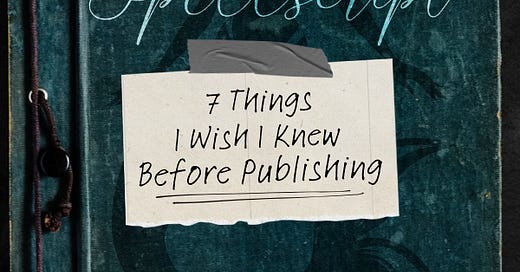7 Things I Wish I Knew Before Publishing
And a little magical inspiration for those moments of doubt.
Dear storyteller,
Today’s spellscript comes with a whisper of vulnerability, the kind that trails behind us like shadowed footsteps on the road to publishing. It’s a look back. A reflective incantation. A list of lessons learned the hard way and the magic I wish I’d had tucked in my pocket the first time I hit "publish."
This wasn’t an easy post to write. Not because I’m ashamed—writing and releasing a book is something I’m deeply proud of—but because no spell is cast perfectly the first time. These are not confessions of failure, but echoes of hindsight, shared in the hope that you won’t feel quite so alone when you face your own doubts and detours.
Here are 7 things I wish I’d thought about before publishing my debut novel:
1. Planning Ahead Will Save You
No amount of coffee or chaos magic will replace the power of a timeline. When I published my first book, I had no clue what was coming. It felt like trying to build a ship while already sailing. So for book two, I created a month-by-month publishing roadmap. It has breathing room, built-in breaks, and a whole lot of grace.
May ‘25 - Plotting, character development, book copy editor and cover designer
June - Begin drafting
September - Finish drafting, begin editing and creating marketing material, put out requests for beta readers
October - Book social media tours, get manuscript to beta readers, begin heavily marketing, book character art (start this the moment you have a budget for it)
November - Get beta reader responses, make edits and prepare draft for copy edits
December - Copy edits begin, book interior artwork with artist
January - Get copy edits back, final edits, proofreading
February - Cover reveal, BookSirens - ARCs, proofreading finishes
May ‘26 - Publish A Serenade of Storms
If you’re overwhelmed, don’t panic. Your timeline doesn’t need to be perfect. Just start it. Let it evolve. Think of it like a magical map—it may not show you everything, but it keeps you moving forward.
2. You Need a Budget (Even if You Hate Budgets)
I won’t lie, this one still makes me break out in nervous sweats. Publishing isn’t just an art; it’s an investment. Editors, cover designers, formatting, ISBNs, marketing—these things add up faster than you’d think.
Even a simple budget can give you clarity and control. And if you’re not a numbers person (hi, same), find someone who is. Treat your book like the precious artifact it is and protect the journey with financial foresight.
3. Think Seriously About Traditional vs. Self-Publishing
Some days, I dream about agents, big book deals, and fancy coffee-shop book signings. But other days, I remember why I chose this path: freedom. Creative control. The power to say yes or no to every element of my book’s creation.
Self-publishing is not the easier path, but for me, it was the truest one. That said, ask yourself the hard questions. What kind of writer do you want to be? What kind of life do you want your book to have? Once you self-publish, the path to traditional publishing can get even more bumpy and uncertain. Choose the path that fits your goals and dreams and work hard for it.
4. It’s Okay to Take Your Time
I rushed. Hard. I launched into marketing before I was ready. I burned myself out. And I see now, in retrospect, that speed isn’t synonymous with success.
Take a breath. Let your book unfold at its pace. Listen to that quiet voice that says, “Wait.” That voice is often wiser than the world shouting, “Go faster.”
5. Make Author Friends. They’re Spellcasters Too.
Writing can be isolating—especially when you’re deep in the drafting woods. But connecting with other writers can be your greatest magical boost. They know the monsters. They know the doubts. And they’re usually carrying extra potions.
So join that Facebook or IG group. Reach out to the writer you admire. Comment on that post. Your future writing self will thank you.
6. Market While You Edit
If I could turn back time (time machine isn’t working it seems), I would have started building my marketing material during my editing process. Pulling powerful quotes, designing aesthetic reels, and dreaming up social content while the story is still fresh and changeable saves so much time.
Bonus? You’ll start to see your book with new eyes, and might even make better edits because of it.
7. Prepare for Imposter Syndrome
This might be the hardest part. The feeling that you’re not good enough. That you’re faking it. That everyone else is ahead and you’re stuck behind.
It creeps in. It lies to you. But remember this: the act of writing, of finishing, of publishing—it’s heroic. You don’t have to be a bestseller to matter. You don’t have to write like Sarah J. Maas to belong. You just have to keep going.
Journal. Rest. Talk to your characters if you need to (they’re great listeners). You’re not alone in this. Not ever. And remember, I’m an email away if you find yourself truly stuck.
We are storytellers. We write in blood and stardust. We rewrite the world we escape to one sentence at a time. And some days, we stumble. But the ink keeps flowing.
So whether you’re planning your debut, midway through your manuscript, or settling down from your first launch, I hope these reflections help guide your steps.
Writing Prompt: Your character stumbles upon a hidden page in their grimoire. The page wasn’t there yesterday. It’s written in a language they don’t know, but their name is scrawled across the top. What does the page say? And what magic does it unlock?
Until next time, keep your quill sharp and your heart brave.
S.L. DeBois




